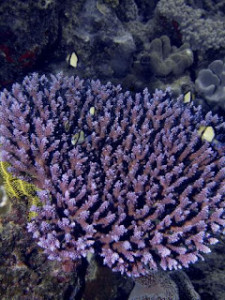
Acroporatable coral on the Great Barrier Reef
(Image (c) Pete Faulkner, Mission:awareness/Marine Photobank”)
Over the past two decades, scientists have linked the decrease in the pH levels of the global oceans and the corresponding slowdown in coral growth to the increasing levels of carbon dioxide trapped in the atmosphere and which in turn are being absorbed in the ocean.
As coral reefs are the primary habitat for several marine organisms, their decline has significant impacts on the health of the marine ecosystems and ocean productivity. To better understand how corals contribute to the global carbon cycle, one of the 2007 DOE JGI Community Sequencing Program projects included plans to generate a dataset of expressed sequence tags or ESTs, small portions of a genome that can be used to help identify unknown genes and chart their locations along the sequence, from the reef-building coral Acroporapalmata.